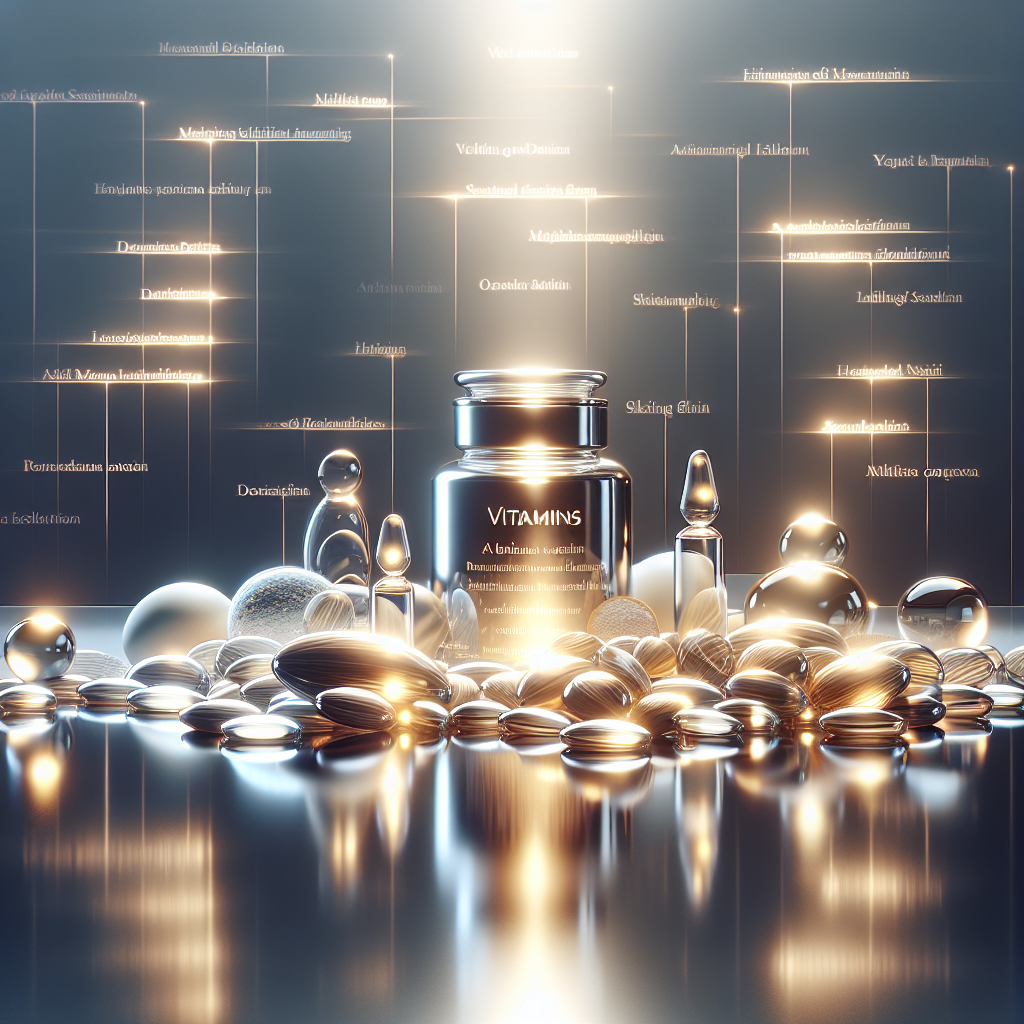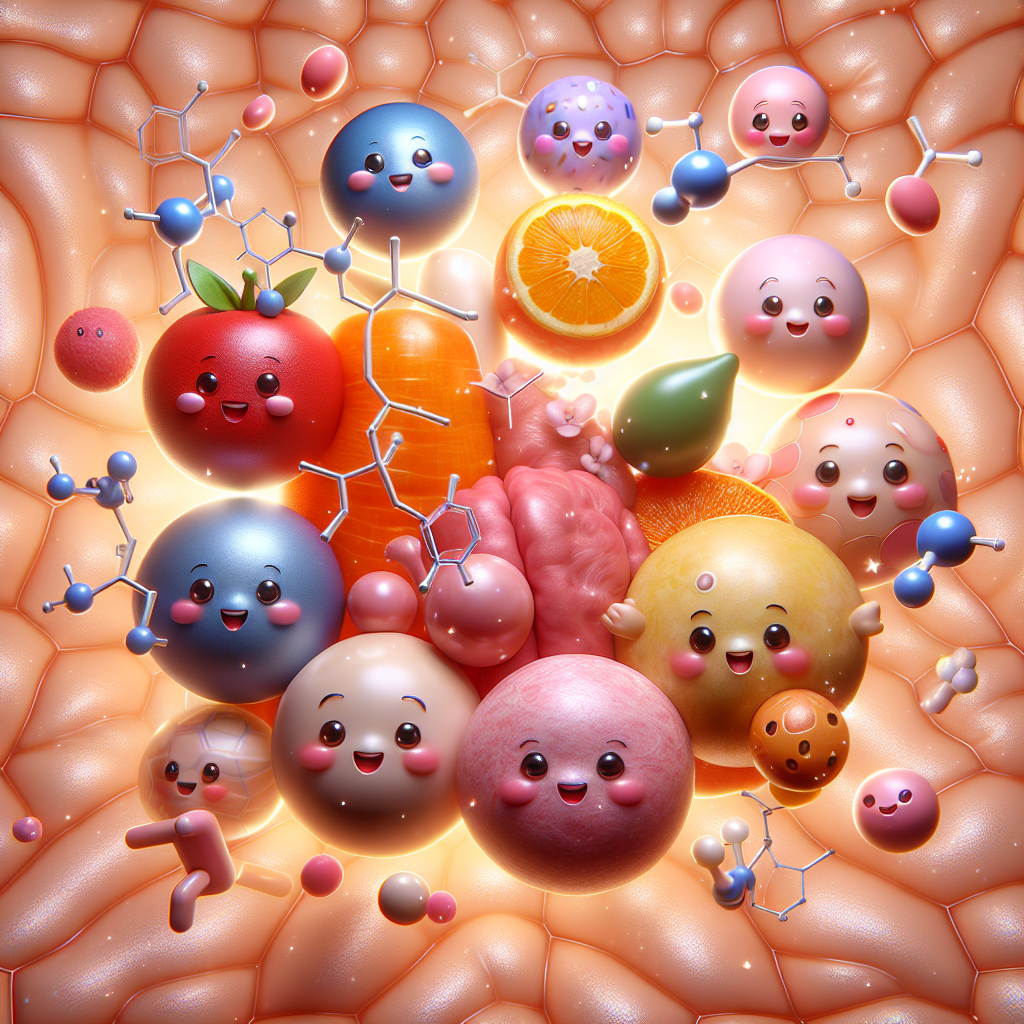Vitamins That Keep Skin Looking Youthful

Discover the vitamins that keep your skin looking youthful! Visit My Vibrant Vitality now to learn more and start your journey to healthier, younger-looking skin.
Essential Vitamins for Maintaining Youthful Skin
The quest for youthful, radiant skin is a universal pursuit that transcends age, gender, and culture. While many turn to expensive creams, serums, and treatments, the secret to maintaining a youthful complexion may be as simple as ensuring you’re getting the right vitamins. Indeed, certain vitamins play a crucial role in skin health, contributing to its elasticity, glow, and overall appearance.
Firstly, let’s consider Vitamin A, often hailed as the ‘anti-aging’ vitamin. This potent antioxidant is essential for repairing skin tissue and maintaining a healthy skin barrier, the outermost layer of skin that protects against environmental aggressors. Retinol, a derivative of Vitamin A, is a common ingredient in many skincare products due to its ability to stimulate collagen production, reduce wrinkles, and improve skin tone. However, it’s not just about topical application; incorporating foods rich in Vitamin A, such as sweet potatoes, carrots, and spinach, into your diet can also contribute to a youthful complexion.
Transitioning to another vital nutrient, Vitamin C is renowned for its skin-brightening and anti-aging properties. It aids in collagen synthesis, a protein responsible for skin’s firmness and elasticity. Moreover, Vitamin C is a powerful antioxidant that neutralizes harmful free radicals, which can cause oxidative stress and accelerate skin aging. Citrus fruits, strawberries, and bell peppers are excellent sources of this essential vitamin.
Next in line is Vitamin E, another antioxidant that works synergistically with Vitamin C to protect the skin from sun damage and environmental stressors. It also helps to keep the skin hydrated, which is crucial for maintaining a plump, youthful appearance. Nuts, seeds, and leafy greens are rich in Vitamin E, making them a valuable addition to your diet.
Vitamin D, often known as the ‘sunshine vitamin’, is another key player in skin health. It’s primarily obtained through sun exposure, but can also be found in foods like fatty fish and fortified dairy products. Vitamin D plays a role in skin cell growth and repair, and a deficiency can lead to dry, flaky skin.
Lastly, let’s not forget about the B-vitamins, particularly B3 (niacin) and B5 (pantothenic acid). These vitamins help to retain moisture, reduce inflammation, and improve the skin’s barrier function. Foods like chicken, tuna, and avocados are rich in these B-vitamins.
In conclusion, while topical skincare products can certainly help to improve the appearance of your skin, it’s equally important to nourish your skin from within. Incorporating a variety of vitamins into your diet can help to maintain a youthful, radiant complexion. However, it’s important to remember that everyone’s skin is different, and what works for one person may not work for another. Therefore, it’s always a good idea to consult with a healthcare professional or a dermatologist before making any major changes to your diet or skincare routine. After all, achieving and maintaining youthful skin is a journey, not a destination.
The Role of Vitamins in Skin Rejuvenation and Anti-Aging

The quest for youthful, radiant skin is a universal pursuit that transcends age, gender, and culture. While many turn to expensive creams, serums, and even surgical procedures to maintain a youthful appearance, the role of vitamins in skin rejuvenation and anti-aging is often overlooked. Vitamins, both when ingested through diet and applied topically, can play a significant role in preserving the skin’s youthful glow and delaying the onset of aging signs.
Vitamin A, also known as retinol, is a powerhouse in the world of skin rejuvenation. It promotes cell turnover, which helps to shed the dull, damaged skin cells on the surface and reveal the fresh, healthy cells underneath. This process of cell renewal helps to smooth fine lines and wrinkles, giving the skin a more youthful appearance. Moreover, Vitamin A is known to stimulate collagen production, a protein that provides structure and elasticity to the skin. As we age, our natural collagen production decreases, leading to sagging skin and wrinkles. By boosting collagen production, Vitamin A helps to maintain the skin’s firmness and elasticity.
Next in line is Vitamin C, a potent antioxidant that protects the skin from damaging free radicals. Free radicals are unstable molecules that can cause oxidative stress, leading to premature aging. By neutralizing these harmful molecules, Vitamin C helps to prevent the signs of aging and maintain the skin’s youthful glow. Additionally, Vitamin C plays a crucial role in collagen synthesis, further contributing to skin firmness and elasticity. It also helps to brighten the skin and fade dark spots, resulting in a more even and radiant complexion.
Vitamin E, another powerful antioxidant, works hand in hand with Vitamin C to protect the skin from oxidative stress. It also has moisturizing properties that help to keep the skin hydrated, which is essential for maintaining a youthful appearance. Dry skin can accentuate fine lines and wrinkles, making them appear more pronounced. By keeping the skin moisturized, Vitamin E helps to smooth these lines and give the skin a plumper, more youthful appearance.
Lastly, Vitamin K is known for its ability to improve the appearance of dark circles and bruises. It helps with blood clotting, which can reduce the appearance of dark circles caused by leaky blood vessels. While it may not directly contribute to skin rejuvenation, it can certainly help to improve the overall appearance of the skin.
In conclusion, vitamins play a crucial role in skin rejuvenation and anti-aging. They help to promote cell turnover, stimulate collagen production, protect the skin from oxidative stress, and keep the skin hydrated. While topical application of these vitamins can provide immediate benefits, incorporating them into your diet can provide long-term benefits. Foods rich in these vitamins include carrots, sweet potatoes, citrus fruits, almonds, and leafy green vegetables. So, the next time you reach for an anti-aging cream, remember that the secret to youthful skin might just be in your kitchen.
Unlocking the Secret to Youthful Skin: Top Vitamins You Need
Unlocking the secret to youthful skin is a quest that has been pursued by many for centuries. In the modern era, the answer lies not in mythical fountains of youth, but in the realm of nutrition and health. Specifically, certain vitamins have been identified as key players in maintaining and enhancing the youthfulness of our skin.
Vitamin A, for instance, is a potent antioxidant that fights against the damaging effects of free radicals, which are unstable molecules that can cause premature aging. It also promotes the production of healthy skin cells, helping to keep the skin firm and smooth. Retinol, a form of Vitamin A, is a common ingredient in many anti-aging skincare products due to its proven effectiveness in reducing wrinkles and fine lines.
Next on the list is Vitamin C, another powerful antioxidant that is essential for the production of collagen, a protein that gives the skin its elasticity. As we age, our bodies produce less collagen, leading to sagging skin and wrinkles. By boosting collagen production, Vitamin C helps to maintain the skin’s firmness and elasticity, giving it a more youthful appearance. Moreover, Vitamin C also aids in skin repair and regeneration, helping to heal damage caused by sun exposure and pollution.
Vitamin E is another vital nutrient for youthful skin. Like Vitamins A and C, it is an antioxidant that protects the skin from damage caused by free radicals. Additionally, Vitamin E has moisturizing properties that help to keep the skin hydrated, preventing dryness and flaking. It also has anti-inflammatory effects, which can help to soothe irritated or inflamed skin.
Vitamin K is less well-known than the others, but it plays a crucial role in maintaining youthful skin. It aids in blood clotting, which can help to heal wounds and bruises. More importantly for our purposes, Vitamin K can also help to reduce dark circles under the eyes, a common sign of aging. It does this by promoting blood circulation in the area, which can help to lighten the skin.
Finally, Vitamin B3, also known as niacinamide, is a rising star in the world of skincare. It has a wide range of benefits, including improving skin elasticity, reducing redness and inflammation, and lightening dark spots. It also helps to strengthen the skin’s barrier function, which can protect against environmental damage and keep the skin looking youthful.
In conclusion, the secret to youthful skin lies not in elusive magic potions, but in the vitamins we consume. By incorporating these vitamins into our diet and skincare routine, we can help to maintain and enhance the youthfulness of our skin. However, it’s important to remember that while these vitamins can help to improve the appearance of our skin, they are not a substitute for a healthy lifestyle. Regular exercise, a balanced diet, adequate sleep, and proper hydration are all essential for maintaining overall health and, by extension, healthy skin.